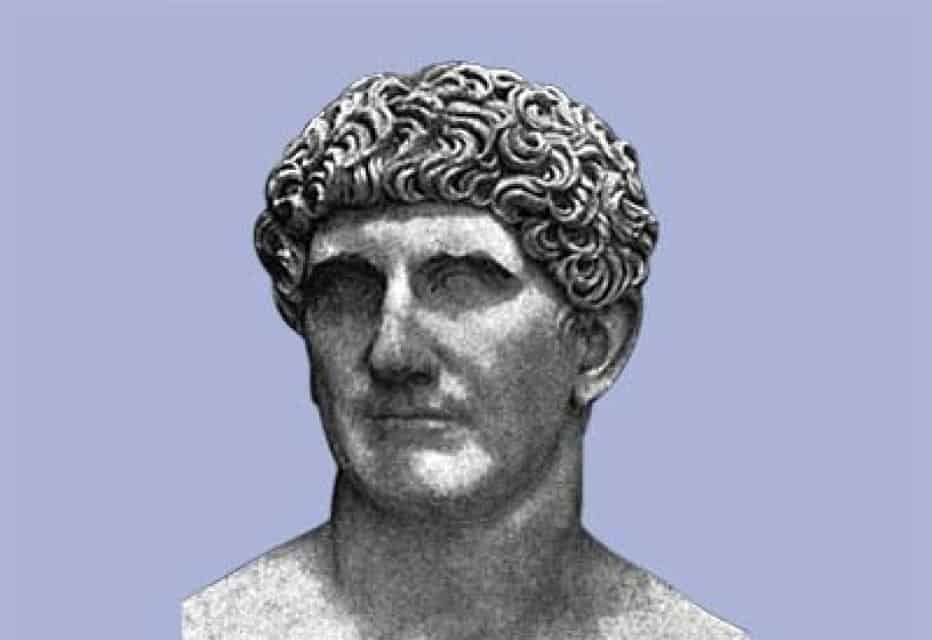Marcus Antonius, commonly known as Mark Antony, is one of the most complex and controversial characters in the history of the Roman Republic. He was born in Rome in 83 BC and his mother was a distant cousin of Julius Caesar. Antony was a politician and soldier who played a huge role in Rome’s transformation from Republic to Empire, although he didn’t live to see the latter.
Antony is known for being a loyal follower of Julius Caesar, and he fought beside the legendary leader in Gaul and during the Civil War against Pompey. Upon the death of Caesar, Antony became locked in a bitter struggle for power with Octavian. In his final years, Antony gained fame for his relationship with Cleopatra of Egypt. Together, they fought against Octavian only to suffer a decisive defeat at Actium in 31 BC. Tragically, he committed suicide in 30 BC in the belief that his lover had done the same. However, she was still alive, so he was taken to see his wife only to die in her arms.
A great deal has been written about this complicated individual but how much do you really know about Mark Antony?

1 – He Wasn’t Really Julius Caesar’s Right-Hand Man
If you’ve read anything at all about Mark Antony, you’ll have seen him referred to as Caesar’s right-hand man. While he liked to boast about this supposed fact, the reality was very different. While he was also an administrator and statesman, Antony’s real skill lay in the military field, and he was an excellent soldier and leader. However, loyalty wasn’t one of his traits.
Before serving with Caesar, Antony worked with different masters in the east and seldom stayed anywhere too long. His primary political patron was Clodius Pulcher, a man known for helping anyone if the price was right. Indeed, Antony’s service under Caesar was provided by Clodius. Caesar knew of Clodius’ reputation so while he had no problems using him, he wasn’t foolish enough to expect loyalty.
Antony excelled as a military commander while serving Caesar but his poor performance as an administrator angered his master who could never fully trust him. Antony was handed governorship of Italy while Caesar was away in Egypt but made such a mess of the role that his master returned home to relieve Antony of office.
It seems increasingly likely that Titus Labienus was Caesar’s, actual right-hand man. Labienus was one of his chief lieutenants in Gaul and performed his role as Tribune of the Plebs in a manner that pleased his commander. While Antony was hopeless in the role of administrator, Labienus excelled and became known as a significant political force. Ultimately, Labienus betrayed Caesar by joining Pompey in the Civil War. Caesar learned his lesson by never trusting one of his men so implicitly. From that point onwards, he ensured several people held important positions, but none held the prominence enjoyed by Labienus.
The incident where Antony was removed from his post in Italy was the beginning of the break up in his relationship with Caesar. Antony’s attitude towards his leader took a turn for the worse, and Caesar quickly grew to distrust his lieutenant. Perhaps this is why Antony never told Caesar that he was approached by conspirators. While he refused to play a role in Caesar’s assassination, his inaction sealed his master’s fate. As he would be the most senior lieutenant left alive in the event of Caesar’s death and his leader’s factions would certainly retaliate, perhaps Antony did nothing because he realized he would become the leader of the Caesarian faction?
Sources suggest he tried to save Caesar but arrived too late to prevent the Ides of March from occurring as senators prevented him from attending the meeting. He fled from Rome dressed as a slave only to return after reaching a compromise with the men who killed Caesar. At his former master’s funeral, Antony gave a rousing speech that energized the crowd to the point where a riot broke out at the assembly. The homes of conspirators were burned to the ground and Cassius, and Brutus left Rome.

